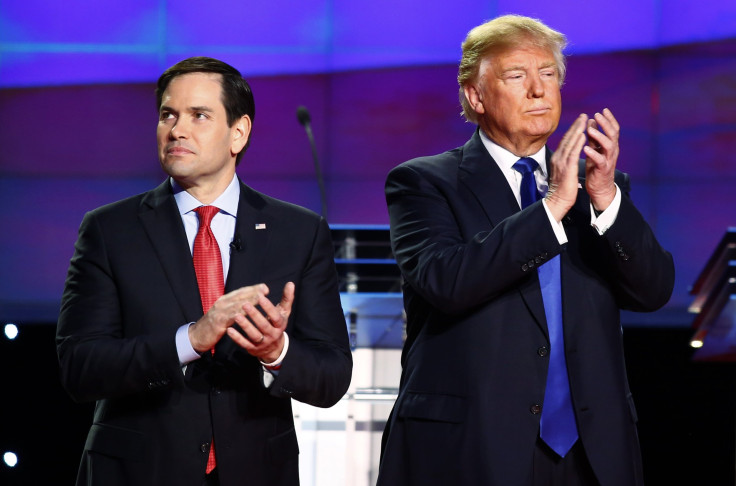Who Is The Republican ‘Establishment,’ And Can They Stop Trump?

Ever since Donald Trump began his romp through the 2016 campaign, Republican angst has ratcheted ever higher with fear that if he became the party's nominee, the real estate billionaire could reshape the GOP (if he won the White House) or cost it not only the presidency but the Senate (if he lost). Pundits and party elders have proclaimed repeatedly that “the Republican establishment” needs to coalesce around a single candidate capable of stopping the front-runner.
That's an easy prescription. But who is that GOP establishment, and how would they persuade competing candidates to drop out?
After poor showings in the first four contests — and plenty of quoted sources, anonymous and otherwise, saying he needed to get hot or go home — former Florida Gov. Jeb Bush suspended his campaign. The party appeared ready to rally around Florida Sen. Marco Rubio; he began to pick up endorsements. But billionaire financier Stanley Druckenmiller stepped in and said he would support Ohio Gov. John Kasich — the only other candidate left in the so-called establishment lane. And then New Jersey Gov. Chris Christie endorsed Trump. So much for the long-held belief that, especially in the GOP, "the party decides."
The "establishment" is, generally, an umbrella term used to describe people engaged in the political process and who support traditional Republican values like fiscal conservatism and limited government. That can include several groups: major donors who have funded GOP candidates or super PACs, Republican activists and strategists, among others.
Some of the establishment is pretty obvious. Former President George W. Bush, still popular among Republicans and with strong family connections to big donors, certainly qualifies. So does someone like South Carolina Sen. Lindsey Graham — who has been vocal about his concern for his party's direction and the threat posed by Trump — and former Republican nominee Mitt Romney, former governor of Massachussetts.
But Republican strategists say it’s unlikely that those men are going to pick up the phone to call Kasich (or Rubio, if he starts to lose momentum) and urge him to clear the lane for his rival. Instead, what may be more likely is that major donors are quietly urging one another to tell their guy that, for the good of the party, it might be time to throw in the towel.
“There’s this whole cloud of major donors who all talk to each other all the time," Rick Wilson, a Republican strategist based in Florida, told International Business Times. "So somebody who’s a big [Texas Sen. Ted] Cruz supporter might call someone — who is their friend who's a big Kasich supporter — and say, ‘You oughta talk to John, who is really a great guy, but I don’t think he can do it.’”
Others disagree. “I don’t know who’s going to have clout on John Kasich except potentially Marco Rubio trying to make a backdoor [agreement] with him,” Ford O’Connell, a top political strategist on the 2008 presidential campaign of John McCain, a former Arizona senator, told IBT.
Contacted for this story, a spokesman for the Kasich campaign said that Rubio should be the candidate to leave the race. The Rubio campaign did not respond to requests for comment.
Looking for influence or at least access, donors pump a lot of money into political elections. So far in the 2016 election cycle, the Republican National Committee has raised upwards of $114.8 million, according to the Center for Responsive Politics. It’s only natural that groups that have traditionally helped choose their party's nominee wouldn't want to concede their role.
But if there’s anything this election cycle has shown, it’s that institutional Republican power is limited. Trump is tapping a well of angry energy that the party seemed unaware of, or unconcerned with, just a year ago. In the end, voters will have their say. Even if Kasich or Rubio drops out, there’s no guarantee that Trump’s support will dry up.
“The Republican Party or the Democratic Party is made up of millions of voters, and there’s nothing to say that if Kasich gets out that those votes will go to Rubio in any meaningful way,” said Rich Galen, a Republican strategist and former press secretary for Newt Gingrich, a former speaker of the House. “We think that, we say that, but when you look at the [polling] cross-tabs of what’s piling up right now, there’s no reason to think at all that 70 percent or 80 percent of Kasich’s support will go to Rubio. They may go to Trump.”
© Copyright IBTimes 2024. All rights reserved.






















